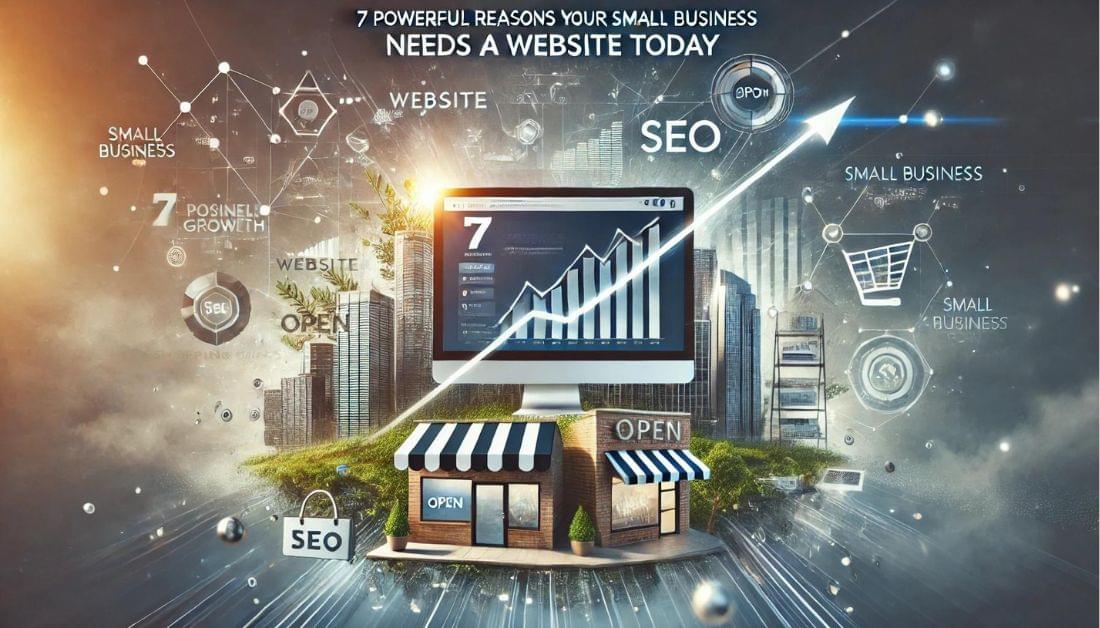Your cart is currently empty!

7 Powerful Reasons Your Small Business Needs a Website Today
In today’s digital age, having a website is no longer a luxury but a necessity for small businesses. Regardless of your industry or location, an online presence can significantly enhance your visibility, credibility, and growth potential. This article explores the top 7 reasons why your small business needs a website and the invaluable benefits it can provide.
Credibility and Trust
A website is your business’s digital storefront, and it plays a crucial role in building credibility and trust with potential customers. In a world where consumers often judge the reliability of a company based on its online presence, not having a website can make your business seem outdated or less legitimate. A well-designed website allows you to create a professional image, share customer testimonials, and provide detailed information about your offerings—all of which help to instill confidence in your audience.
24/7 Accessibility
A physical store is limited by its business hours, but a website is open 24/7. This means customers can learn about your business, browse products, or make inquiries at any time, day or night. Whether you run a local service or an e-commerce business, this constant accessibility enhances customer convenience and increases your chances of capturing sales and leads outside of normal working hours.
For instance, if a potential customer searches for your services after hours, a website allows them to get the information they need and possibly make a purchase or book an appointment right away. This level of convenience is something that physical locations simply can’t match.
Cost-Effective Marketing
Traditional marketing methods like print ads, billboards, or radio spots can be expensive and offer limited reach. In contrast, a website provides a more cost-effective way to promote your business and reach a larger audience. By utilizing digital marketing strategies like search engine optimization (SEO), content marketing, and social media integration, you can drive targeted traffic to your website without breaking the bank.
Once your website is live, it becomes a long-term marketing asset. You can continuously update it with fresh content, promotions, and news, all at minimal cost. This ongoing marketing potential offers a far better return on investment (ROI) compared to traditional advertising.
Online Sales and E-Commerce Opportunities
For small businesses, a website can serve as a new sales channel. Whether you’re selling physical products, digital downloads, or services, e-commerce functionality on your site can expand your reach and increase revenue. With an online store, you can sell to customers beyond your local area and even globally, all without the overhead costs of a physical storefront.
Even service-based businesses can benefit from online sales features, such as appointment booking systems, subscriptions, or virtual consultations. By offering these options through your website, you provide customers with a seamless and convenient way to engage with your business.
SEO and Expanding Reach
Search engine optimization (SEO) is the practice of optimizing your website to rank higher in search engine results, making it easier for potential customers to find you. For small businesses, local SEO is especially important because it helps you attract customers in your geographical area who are searching for services like yours.
A website allows you to leverage SEO to appear in relevant searches, whether for local services or niche products. This expanded reach can help you tap into new customer bases that may not have discovered your business through traditional marketing methods.
Competitive Edge
In today’s competitive marketplace, having a website is essential for staying ahead of the competition. If your competitors have websites and you don’t, they are likely capturing customers that could have been yours. A website gives you a platform to showcase your unique value proposition, highlight your products or services, and keep customers informed about promotions or new offerings.
Moreover, a website allows you to differentiate your business from others by providing detailed content, engaging visuals, and interactive features that help customers connect with your brand. It also gives you a space to share your story and what makes your business stand out, which can be a deciding factor for customers when choosing between you and a competitor.
Conclusion
In conclusion, a website is a powerful tool that offers numerous benefits for small businesses, from building credibility to expanding your customer reach and increasing sales. In today’s digital landscape, not having a website means missing out on significant opportunities for growth and customer engagement. If you’re ready to take your business to the next level, it’s time to invest in a professional website that reflects the quality and value of your brand.